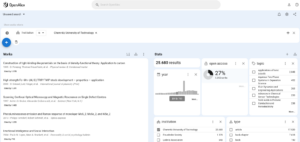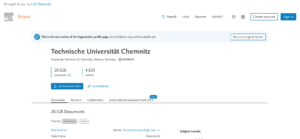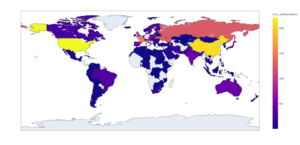Scientific research tools such as Scopus, Web of Science or Dimensions have now become established. Many researchers have stored complex search queries in their favourite database. However, the cost of these platforms is a significant item in the budgets of libraries and research institutions.
What if there was a bold, free alternative to these expensive tools? Actually, there is, and there has been for some time, but only recently has it started to gain traction: OpenAlex.
OpenAlex can be defined as “a fully open catalogue of the global research system”. It has been maintained by OurResearch since around mid-2021 and the data comes from the Microsoft Academic Graph, Crossref, institutional repositories (via OAI-PMH) and much more. OpenAlex has access to a large amount of data and is based on persistent IDs (DOIs, ORCID, ROR, etc.).
Don’t be fooled by the minimalist interface and the absence of corporate design colours. OpenAlex concentrates on the essentials and does its job very well. Until a few months ago, queries could only be made via the API. Now it has a graphical user interface that is constantly being updated and improved. I have an account where I can save my queries. I find it simple and useful, but perhaps it is still too little for a researcher. However, development continues.
I then ran some tests and entered the name of TU Chemnitz to see the results:

Here the results from Scopus:

Very good. We have about 6,000 more results than Scopus. However, this does not mean that all the works displayed are actually related to Chemnitz University of Technology. Quality control still needs to be improved in OpenAlex. However, I was also impressed by the presence of some graphics.
If you are a researcher, I invite you to enter your name in OpenAlex and check that all the data is correct. It is also possible to calculate your own H-index with this script in Jupyter Notebook (if you need help, write to me).
I also tested this script, which uses the data from OpenAlex to show which co-operations TU Chemnitz has with other universities worldwide. Here is the result:
This is only a first approach to OpenAlex, and it is necessary to deepen the knowledge of the data structure and quality control. There is a lot of potential in it and its possibilities are currently limited, but it is an interesting project and it is worth giving it a chance.

